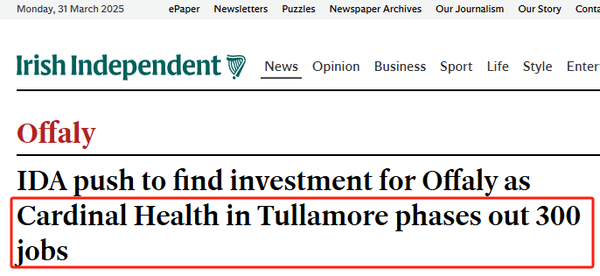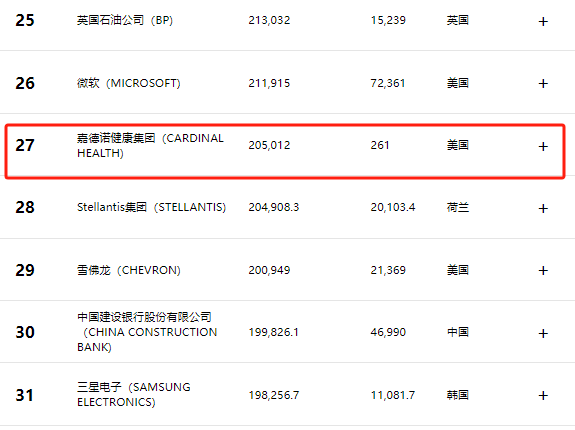Medical Device Giant: Lays Off 300 Employees, To Close Plant in April Next Year!
01
Cardinal Health lays off 300 employees.
Recently, according to the Irish Independent, global medical device giant Cardinal Health (hereinafter referred to as Cardinal Health) is gradually cutting 315 jobs in County Offaly, Ireland, as the manufacturing operations at the plant are being relocated to Mexico and Costa Rica.

Source: Irish Independent
As a result, the Tullamore facility will be phased out gradually. The first group of employees will leave in April 2025, and the second group will depart in April or May 2026.
The report pointed out that in Canfor’s latest submitted performance, despite the revenue decreasing by 16% to 39.9 million euros in the 12 months up to the end of June last year, the pre-tax profit surged 20% to 6 million euros compared to 5 million euros in the previous fiscal year.
Irish Republican Party MP Barry Cowen described the closure of the facility as "a significant blow to the local economy" and "a dark day."
He said, "The closure of the Cardinal Health factory will have a profound impact on our local workforce. For nearly half a century, the factory has hosted several medical device companies, and some employees have even worked there for more than 20 years."
Cardinal Health, the fifth international medical device group to operate the Tullamore plant, is the 14th largest revenue-generating company in the United States, ranking 27th in the 2024 Fortune Global 500, just behind Microsoft and ahead of Samsung Group.

2024 Fortune Global 500 Source: Fortune official website
Looking back over the past decades of major upheavals in the medical equipment industry, the Tullamore factory has changed hands multiple times, serving as a key witness to the shifting landscape of today's leading medical equipment enterprises.
The factory was established in 1982 by Sherwood Medical, an American disposable medical products manufacturer. In 1998, the factory was acquired along with the company by Tyco Healthcare, which is the predecessor of the renowned Medtronic Covidien.
In 2007, Tyco Healthcare spun off its healthcare business to form Covidien. By the end of 2014, Covidien's business spanned more than 150 countries worldwide, with over 39,000 employees.
In January 2015, Covidien was acquired by Medtronic for $49.9 billion (47 billion euros), and the Tullamore factory also came under the purview of Medtronic.
In 2017, Medtronic sold 17 company facilities to Cardinal Health for a value of $6.1 billion (approximately 43.4 billion yuan), with the Tullamore factory being one of them.
Cardinal Health stated, "The decision to close the facility is part of our regular evaluation of global business, manufacturing, and supply chain operations, aimed at ensuring we can meet the evolving needs of our customers, industry, and business."
From being at the forefront of the industry and being highly sought after by major giants to its current state of closure and decline, the "life" of the Tullamore factory also reflects the rise and fall of an era in the machinery industry.
02
Major companies接连关闭工厂并退出市场。
Looking far and wide, as a strategic hub for global top-tier companies, Ireland gathers many leading firms in the medical device industry.
Boston Scientific has been continuously deepening its presence in the Irish market since its initial layout in 1994, Abbott has been rooted in Ireland for over 70 years, and Medtronic, through its strategic acquisition of Covidien in 2015, relocated its global headquarters to Dublin, forming a comprehensive industrial ecosystem in Ireland that spans over four decades.
However, compared to previous years, the enthusiasm of medical device giants for Ireland seems to be cooling in the past two years.
Last July (2024), following the layoffs of 60 people at BD Medical's Drogheda plant in Ireland in 2023, the company announced further layoffs of 200 people and the closure of the factory.

As the oldest of BD Medical's four bases in Ireland, the Drogheda plant has just celebrated its 60th anniversary.
From a functional perspective, this factory mainly supports BD's largest business segment—the medical sector—covering everything from diabetes care to drug delivery solutions. In view of this, over the past few years, BD has made several substantial investments in this long-established factory.
According to the statement, nearly $160 million (approximately 945 million yuan) has been invested in the past decade. In 2021, BD also announced an investment of 62 million euros (approximately 480 million yuan) in the area to expand the production of PosiFlush syringes.
BD announced that after reviewing its manufacturing and supply chain network, it has decided to close the factory. Reports indicate that the phased closure includes layoffs of about 110 positions scheduled to begin in March 2025. The remaining layoffs will take place between March and September 2026.
Going further back, in February 2024, Thermo Fisher considered closing a factory in Ireland, which would affect 60 employees.
In April 2023, Medtronic also announced layoffs at its Galway, Ireland facility, citing factors such as inflation, a strong U.S. dollar, and supply chain issues that have impacted its "profit margins and profitability."

"The Irish Independent" wrote pessimistically in January this year that the employment boom in Ireland's multinational sector has stalled, with no increase in employment numbers expected in the next two years.

Source: Irish Independent
This is the first time that the industry has failed to achieve a net increase in jobs for several consecutive years since 2010, while in the previous eight years, multinational companies increased an average of 15,000 jobs annually in Ireland.
Hays, which claims to be "the world's largest professional recruitment company," has reported that its net fees in the UK and Ireland fell by 14% in total, with fees earned from permanent job placements dropping by 19%.
It is worth mentioning that in recent years, strengthening tax regulation has become a consensus among governments around the world. Governments, led by the United States, have long struggled against the habitual tax avoidance methods known as "Irish sandwich."
U.S. President Trump has repeatedly expressed dissatisfaction with this, stating that Ireland has attracted a large number of American pharmaceutical companies through its tax policies. He criticized the significant trade imbalance between the U.S. and Ireland, claiming that Ireland and the EU have been "taking advantage of the U.S." for a long time.

Image source: The Guardian
In this regard, experts have pointed out that after Trump accused Ireland of "stealing" U.S. taxes and jobs, U.S. medical companies headquartered in Ireland are likely to repatriate their profits back to the United States.
Looking back at the 1980s, Ireland introduced tax incentives to attract investments from tech giants like Microsoft and Apple in response to its financial crisis and high unemployment rates, and assisted in designing multinational tax avoidance structures.
This model has made Ireland a 'tax haven': a 2015 OECD report showed that 73% of Fortune 500 companies used tax havens to transfer profits; in 2017, over $700 billion of multinational profits were hidden in low-tax jurisdictions.
As international consensus on anti-tax avoidance has strengthened, in 2021, the OECD promoted a historic tax agreement among 136 countries, establishing a global minimum corporate tax rate of 15%.
After the implementation of the new rules, if Ireland maintains its 12.5% tax rate, companies will still need to pay an additional 2.5% tax to their home countries. This "tax differential top-up" mechanism significantly reduces the incentive for profit shifting, marking a shift in the international tax system from a race to the bottom to collaborative governance. The space for tech giants to avoid tax burdens through tax planning has been notably compressed.
However, in stark contrast to the layoffs and job losses in Ireland, medical device companies such as Medtronic, GE Healthcare, Philips, Omron, and Mindray are rapidly expanding in markets like India and Mexico.
When the last machine ceases its operation, the mechanical roar of the Tullamore factory will finally dissipate in the wind across the Irish plains.
This factory, which has undergone four cross-border mergers and acquisitions and witnessed the golden age of the global medical device industry, ultimately becomes a footnote of the era in the wave of restructuring the international tax system.
【Copyright and Disclaimer】The above information is collected and organized by PlastMatch. The copyright belongs to the original author. This article is reprinted for the purpose of providing more information, and it does not imply that PlastMatch endorses the views expressed in the article or guarantees its accuracy. If there are any errors in the source attribution or if your legitimate rights have been infringed, please contact us, and we will promptly correct or remove the content. If other media, websites, or individuals use the aforementioned content, they must clearly indicate the original source and origin of the work and assume legal responsibility on their own.
Most Popular
-

Key Players: The 10 Most Critical Publicly Listed Companies in Solid-State Battery Raw Materials
-

Vioneo Abandons €1.5 Billion Antwerp Project, First Commercial Green Polyolefin Plant Relocates to China
-

EU Changes ELV Regulation Again: Recycled Plastic Content Dispute and Exclusion of Bio-Based Plastics
-

Clariant's CATOFIN™ Catalyst and CLARITY™ Platform Drive Dual-Engine Performance
-

List Released! Mexico Announces 50% Tariff On 1,371 China Product Categories






